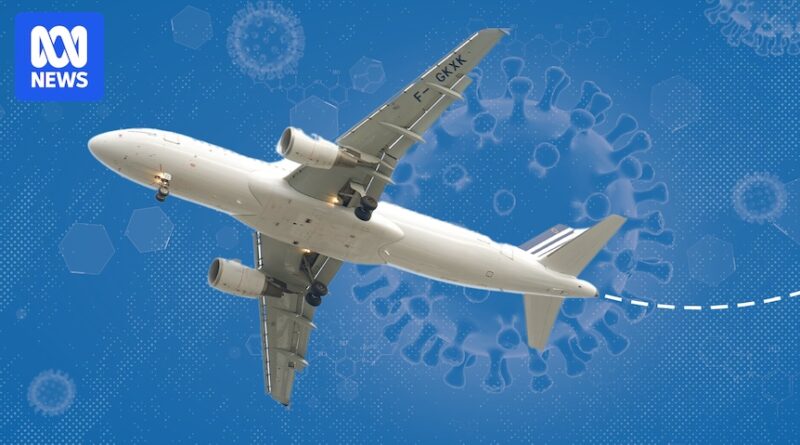How you can stay healthy when travelling overseas and what to do if you get sick
As many Australians prepare to jet off to warmer Asian climates for a winter break, health experts are urging them to stay vigilant for infectious diseases including COVID-19.
New COVID-19 subvariants are circulating across popular holiday destinations in South-East Asia, prompting health alerts and increased screening and surveillance measures in some ports.
While there are no new travel warnings specifically for Australians, doctors say now is the time to check vaccinations, pack health essentials, and take basic precautions like mask-wearing in crowded areas.
Here’s what’s happening in the region — and how you can stay healthy overseas, regardless of where you’re travelling.
What’s going on with COVID in South-East Asia?
More than 236,000 COVID infections have been reported across South-East Asia in the past few weeks, according to the World Health Organization (WHO).
That includes more than 85,000 in Thailand and over 5,000 in India in the past week. The WHO says a new subvariant, NB.1.8.1, is driving an increase in cases in parts of South-East Asia and the Western Pacific.
The organisation is urging countries in the region to strengthen surveillance and encourage vaccinations.
Paul Griffin says tourists should be aware of the spread of COVID sub-variants across South-East Asia. (Reuters: Chalinee Thirasupa)
In Bangladesh, authorities have urged citizens to avoid non-essential trips to India, Singapore, Thailand, Malaysia and Indonesia due to a sudden rise in COVID cases in those places.
The country has also bolstered health screening and surveillance measures at land, sea and air ports.
Professor Paul Griffin, an infectious diseases expert at the University of Queensland, says Australians should be aware of the spread of new subvariants.
“The risk of COVID is still significant — both while travelling and here in Australia,” Professor Griffin says.
“The backbone of protection, whether at home or overseas, is vaccination and we’re simply not doing enough of that at the moment.”
Professor Griffin says the wave of new infections is linked to the FLiRT subvariant family and the newer NB.1.8.1 strain.
“It’s not necessarily more severe, but it does seem better at evading previous immunity and attaching to human cells, making it more infectious,” he says.
“That’s why it’s important to have a recent booster, like the JN.1-based one, which still offers excellent protection against these new strains.”
Should I cancel my trip to these places?
Australia’s Department of Foreign Affairs and Trade (DFAT) has not issued any new travel alerts specifically for COVID risk in South-East Asia.
However, it has advised to exercise a “high degree of caution” in Indonesia overall due to security risks.
The Australian government recommends you monitor Smartraveller for destination-specific health advice and stay informed about local rules and entry requirements.
Broadly, there are no signs Australians are reconsidering travel.
Demand for international flights remains high, with a new report from the Australian Travel Industry Association (ATIA) showing outbound travel up 12.1 per cent in the 12 months to April.
ATIA chief executive Dean Long says Australians are prioritising value and climate while COVID “is not really part of the decision-making process for most people”.
“People who are worried are still taking precautions, but it’s no longer top of mind for the majority of travellers.”
How can you reduce the chance of getting sick overseas?
Okay, but what if you’re planning to travel elsewhere internationally?
Professor Griffin says healthy, vaccinated Australians can still travel safely but need to factor COVID into their planning.
Paul Griffin says there are a number of basic things every traveller can do to help prevent sickness. (Supplied)
“There are still basic things everyone can do: get a booster, wear a mask when appropriate, practice good hand hygiene and make sure you’re in well-ventilated spaces,” he says.
“That helps to reduce your risk of not just COVID but a whole range of other infections too.“
Professor Griffin says older Australians or those with pre-existing health conditions should consider getting tailored medical advice before they leave.
He recommended making sure vaccinations are up to date at least two weeks before departure.
What can you do if you do get sick?
Doctors say the best defence is preparation.
Pack a basic travel health kit, including hand sanitiser, masks, electrolytes, paracetamol and any personal medications.
If you do fall ill overseas, DFAT advises seeking local medical care promptly and contacting your travel insurer early, as they may help organise treatment or cover costs.
If you’re too sick or need help finding an English-speaking doctor, DFAT can provide a list of nearby doctors or hospitals.
Consular officials can help connect you with local healthcare and provide support in emergencies.
Is travel insurance worth it?
Experts say yes, but only if you read the fine print.
Professor Griffin reiterated the importance of carefully reviewing travel insurance policies before departure.
“One of the big issues is coverage for pre-existing conditions,” he says. “If your illness is deemed related to one of those, you may not be covered — even for COVID.”
He also warned some insurers have scaled back the extra COVID protections they introduced during the pandemic, so you could be caught out if you need to cancel or extend your trip due to illness.
“If you get sick, you may need to isolate or delay your return. That’s where good travel insurance really becomes critical.”
Indonesia remains a popular overseas holiday destination for Australians. (AFP: Sonny Tumbelaka)
Mr Long urged Australians to go beyond the basics for travel insurance, warning that some credit card policies offer limited protection.
“There are a number of policies that now include COVID because it’s just a health condition,” he says.
“Make sure you read the fine print particularly if you have a pre-existing health condition. Really, if you can’t afford travel insurance, you can’t afford to travel.“





